Athletes often face overwhelming competitive expectations that can lead to mental fatigue, impacting performance and recovery. Recognizing signs of mental fatigue is crucial for effective intervention. Strategies like mindfulness and structured recovery can enhance mental resilience. Additionally, innovative techniques such as intermittent fasting and neurofeedback training offer unique solutions for overcoming mental challenges in sports.
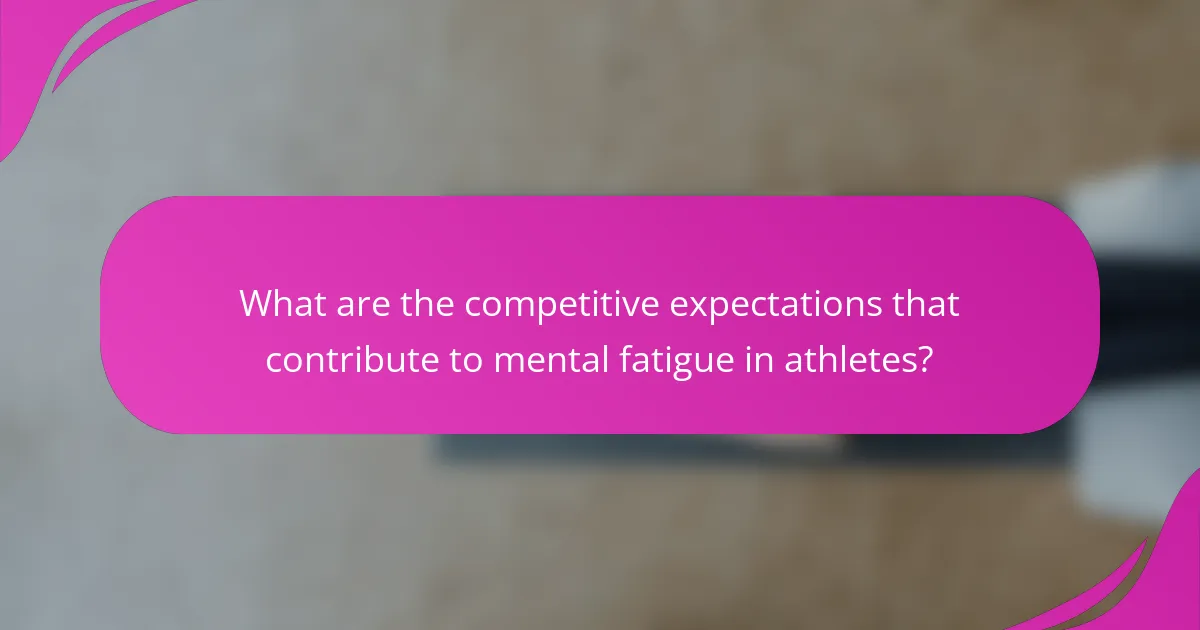
What are the competitive expectations that contribute to mental fatigue in athletes?
Competitive expectations can significantly contribute to mental fatigue in athletes through pressure to perform, fear of failure, and high stakes. These factors create stress that can overwhelm an athlete’s mental resources. High expectations from coaches, peers, or self can lead to anxiety, impacting focus and decision-making. As a result, athletes may experience burnout, reducing their overall performance and recovery. Addressing these expectations through mental strategies, such as visualization and mindfulness, can enhance resilience and performance.
How do performance pressures impact mental well-being?
Performance pressures can significantly harm mental well-being by causing stress and anxiety in athletes. These pressures often lead to mental fatigue, which negatively affects both performance and recovery. Research indicates that high expectations can trigger a cycle of stress, reducing focus and motivation. To combat this, athletes can adopt mental resilience strategies, such as mindfulness and goal-setting, to maintain their mental health and enhance performance.
What role do external factors play in athlete stress levels?
External factors significantly influence athlete stress levels, impacting performance and recovery. Competitive expectations create pressure, leading to mental fatigue. Athletes may experience anxiety from media scrutiny, fan expectations, and performance benchmarks. This external stress can hinder focus and motivation, resulting in decreased performance. Managing these factors through mental training and support systems can enhance resilience and recovery.
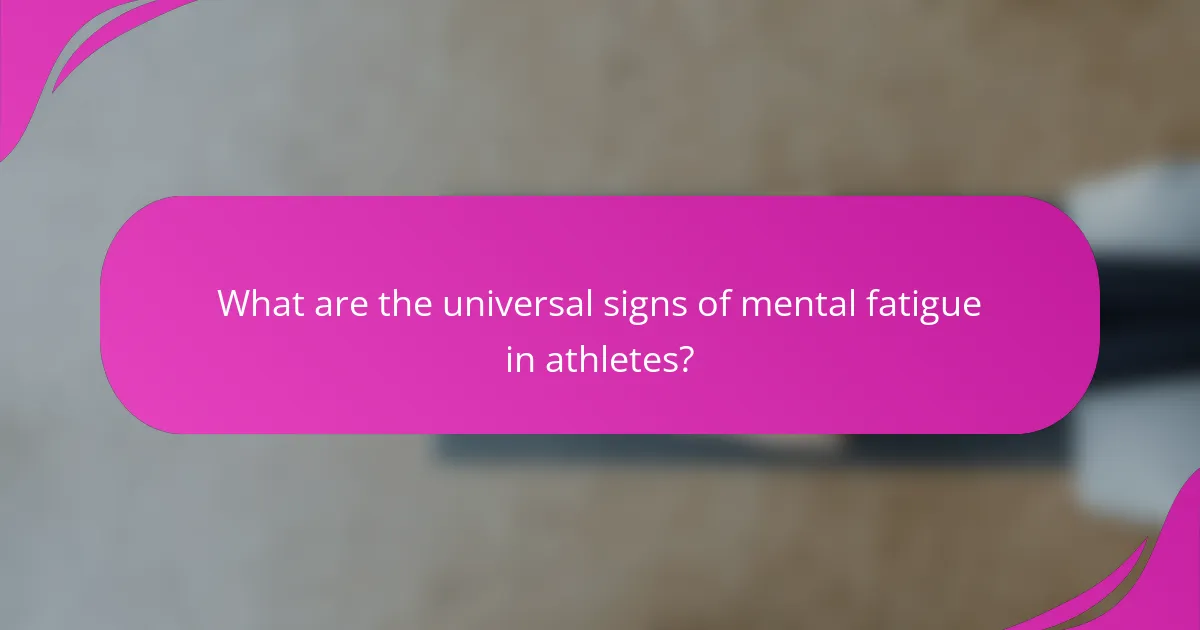
What are the universal signs of mental fatigue in athletes?
Universal signs of mental fatigue in athletes include decreased motivation, increased irritability, difficulty concentrating, and disrupted sleep patterns. These symptoms can hinder performance and recovery. Recognizing these signs early is crucial for implementing strategies to combat mental fatigue. For instance, athletes may experience a decline in their usual training intensity or a lack of enthusiasm for competition. Addressing mental fatigue through rest, mindfulness, or professional support can enhance overall athletic performance.
How can athletes identify symptoms of mental fatigue?
Athletes can identify symptoms of mental fatigue by recognizing signs like decreased motivation, difficulty concentrating, and increased irritability. These indicators often emerge from the pressure of competitive expectations. Monitoring emotional and cognitive states helps in early detection. Regular self-assessment can enhance recovery and performance.
What physical manifestations accompany mental fatigue?
Mental fatigue can lead to physical manifestations such as muscle weakness, reduced coordination, and increased perception of effort. These symptoms hinder athletic performance and recovery. Research indicates that mental fatigue can negatively impact reaction times and overall physical endurance. Athletes experiencing mental fatigue may also report heightened feelings of fatigue and decreased motivation, further affecting their training and competition outcomes.
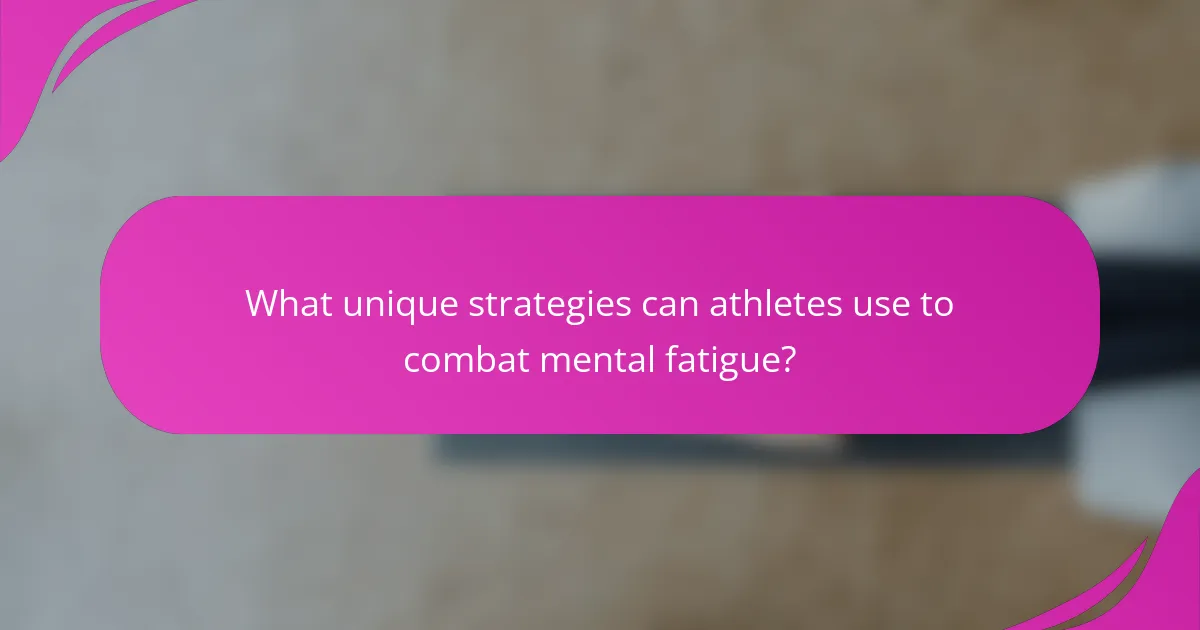
What unique strategies can athletes use to combat mental fatigue?
Athletes can combat mental fatigue by implementing unique strategies such as mindfulness, structured recovery, and cognitive reframing. Mindfulness techniques enhance focus and reduce anxiety, promoting mental clarity. Structured recovery periods, including active rest and sleep optimization, support mental rejuvenation. Cognitive reframing helps athletes reinterpret stressors positively, fostering resilience. These strategies collectively improve competitive expectations and overall performance.
How do mindfulness practices specifically aid recovery?
Mindfulness practices aid recovery by reducing stress, enhancing focus, and improving emotional regulation. These benefits lead to better mental clarity and resilience, essential for athletes facing competitive expectations. Research shows mindfulness can lower cortisol levels, promoting faster recovery from physical exertion. Additionally, mindfulness techniques help athletes develop a stronger mind-body connection, which enhances overall performance. Regular practice fosters a positive mindset, crucial for overcoming mental fatigue and achieving peak athletic performance.
What nutritional approaches can enhance mental resilience?
A balanced diet rich in omega-3 fatty acids, antioxidants, and vitamins enhances mental resilience. Foods like fatty fish, berries, and leafy greens support cognitive function and reduce mental fatigue. Regular intake of these nutrients improves mood and focus, essential for athletes facing competitive expectations. Hydration is also crucial; dehydration can impair cognitive performance. As a result, maintaining proper fluid intake is vital for optimal mental resilience during training and competition.
Which supplements are known to support cognitive function?
Certain supplements are known to enhance cognitive function, particularly for athletes facing mental fatigue. Key supplements include omega-3 fatty acids, which support brain health, and creatine, which improves energy metabolism in the brain. Bacopa monnieri is also effective for memory enhancement, while Rhodiola rosea aids in reducing fatigue and improving mental performance. Additionally, L-theanine promotes relaxation without drowsiness, making it beneficial for focus during training.
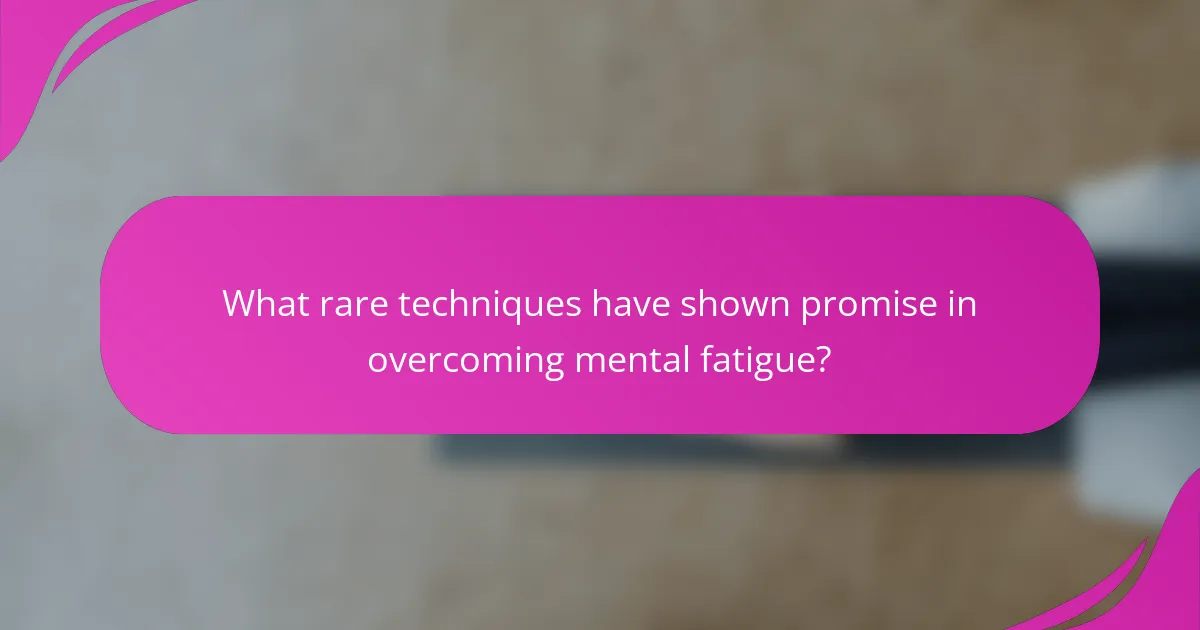
What rare techniques have shown promise in overcoming mental fatigue?
Intermittent fasting and neurofeedback training are rare techniques showing promise in overcoming mental fatigue. Intermittent fasting can enhance focus and cognitive performance by optimizing energy levels. Neurofeedback training helps athletes regulate brain activity, improving mental resilience and recovery. Both methods address mental fatigue uniquely, offering athletes innovative strategies for enhanced performance.
How does neurofeedback therapy assist athletes in recovery?
Neurofeedback therapy enhances athletic recovery by training the brain to optimize performance and manage stress. This therapy helps athletes regulate their mental states, reducing fatigue and improving focus. Studies show that athletes using neurofeedback report quicker recovery times and enhanced resilience. Additionally, neurofeedback can lead to better sleep quality, a critical factor in recovery.
What emerging technologies are being used to monitor mental fatigue?
Wearable devices, brainwave monitoring, and AI algorithms are emerging technologies used to monitor mental fatigue. These tools provide real-time data on cognitive load, allowing athletes to optimize performance and recovery. Wearables track physiological signals like heart rate variability and sleep patterns, while brainwave monitors assess mental states through EEG readings. AI algorithms analyze this data to predict fatigue levels and suggest recovery strategies. This integration enhances athletic training by addressing mental fatigue proactively.
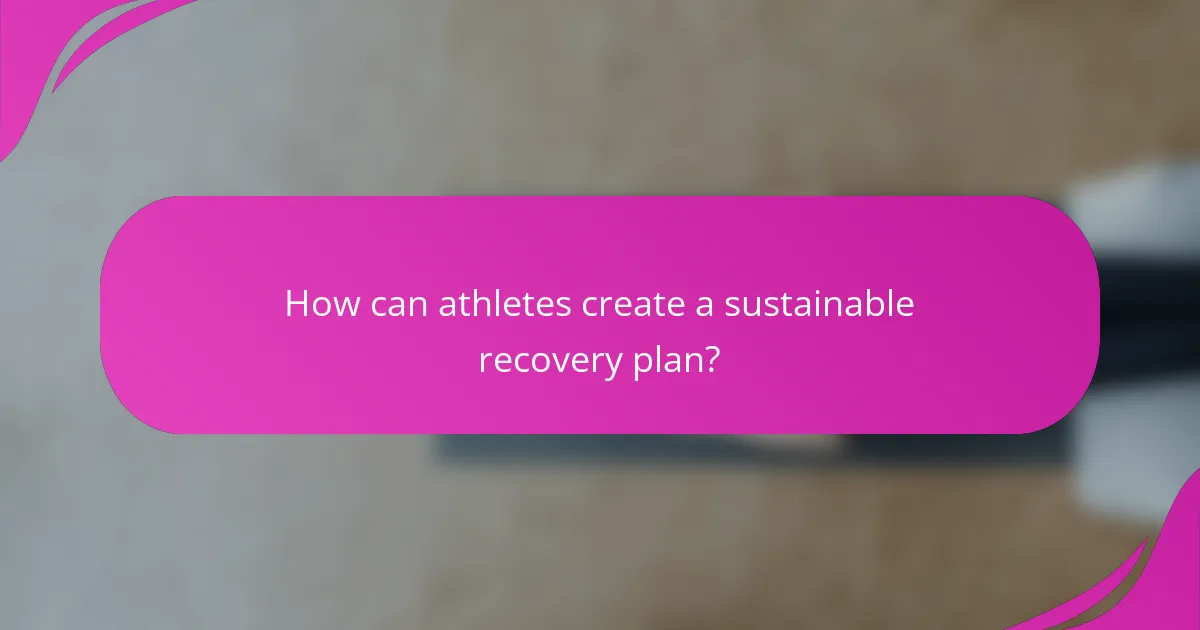
How can athletes create a sustainable recovery plan?
Athletes can create a sustainable recovery plan by integrating mental recovery techniques alongside physical strategies. Prioritizing rest, mindfulness, and structured downtime enhances overall performance.
Establishing a routine that includes adequate sleep, hydration, and nutrition is vital. Mental fatigue can diminish focus and motivation, which affects training and competition. Incorporating practices like meditation or visualization can foster mental resilience.
Tracking recovery metrics, such as heart rate variability and perceived exertion, provides insights into recovery progress. Regular evaluations allow athletes to adjust their plans effectively.
Finally, seeking support from coaches or sports psychologists can facilitate the development of personalized recovery strategies. This collaborative approach ensures athletes address both physical and mental aspects of recovery.
What daily habits contribute to long-term mental health?
Daily habits that foster long-term mental health include regular physical activity, mindfulness practices, and a balanced diet. Engaging in consistent exercise enhances mood and reduces anxiety. Mindfulness techniques, such as meditation, improve emotional regulation and resilience. A nutritious diet supports brain function, affecting overall mental well-being. Prioritizing sleep and social connections further contributes to sustained mental health.
How can athletes balance training and recovery effectively?
Athletes can balance training and recovery by prioritizing mental wellness alongside physical preparation. Effective strategies include scheduled rest days, mindfulness practices, and maintaining open communication with coaches. Research indicates that mental fatigue can hinder performance; thus, integrating recovery techniques enhances both physical and psychological resilience. Athletes should also monitor their mental state to identify when they need breaks, ensuring sustainable progress without burnout.

What expert insights can guide athletes in managing competitive expectations?
Expert insights for athletes managing competitive expectations emphasize mental resilience and strategic planning. Establish clear goals to maintain focus and reduce anxiety. Develop routines that promote consistency, enhancing performance under pressure. Utilize visualization techniques to mentally rehearse success, improving confidence. Engage in open communication with coaches and peers to foster a supportive environment. Regularly assess and adjust expectations based on performance feedback, ensuring they remain realistic and attainable. Emphasizing recovery strategies, such as adequate rest and nutrition, further supports mental clarity and overall performance.
What common mistakes should athletes avoid in their recovery journey?
Athletes should avoid unrealistic expectations, neglecting mental recovery, and disregarding individualized recovery plans. These mistakes can hinder performance and prolong recovery time. Recognizing the importance of mental health is crucial; mental fatigue can significantly impact physical recovery. Additionally, athletes should prioritize rest and recovery over pushing through pain, as this can lead to injuries and setbacks.
How can athletes optimise their mental performance for competition?
Athletes can optimize their mental performance by implementing effective strategies to overcome mental fatigue. Techniques such as visualization, mindfulness, and goal-setting enhance focus and resilience. Research indicates that mental fatigue negatively impacts performance, leading to decreased motivation and physical output. Incorporating regular mental training sessions can significantly improve athletes’ cognitive endurance, allowing for better recovery and performance during competitions.